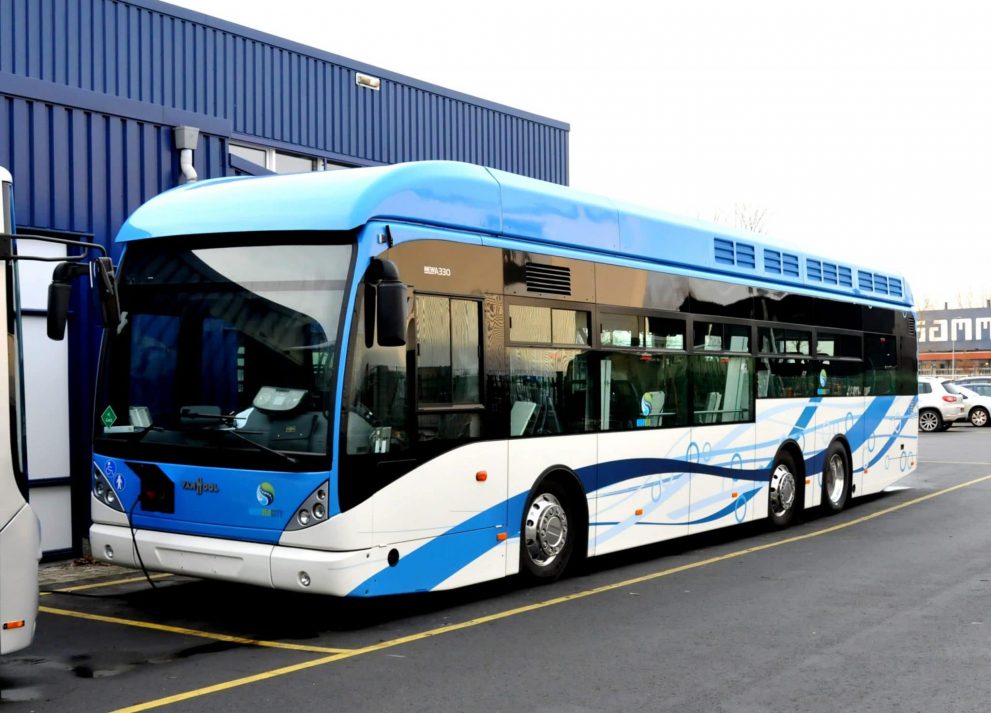
Now hitting multi-year lows, Canadian cleantech company Ballard Power Systems (Ballard Power Stock Quote, Charts, News, Analysts, Financials TSX:BLDP) may look enticing to investors hoping to catch a name with some clear industry tailwinds at a cheap price. But you’ll want to wait on this one, says Rob Lauzon of Middlefield Capital, who thinks there could be more life to the current pullback on high-growth, high-risk stocks.
“We did own [Ballard] in our clean power fund. It was a way for us to get exposure to hydrogen fuel cells, which is a secular trend, but again, a lot of these companies a year and a half ago were trading at different multiples than they are now,” said Lauzon, speaking on BNN Bloomberg on Tuesday.
Vancouver-based Ballard Power, which makes fuel cells for medium- and heavy-duty vehicles, saw its share price shoot skyward in 2020 as a wave of interest in renewable energy and clean technology reached a fever pitch. And peak it did, as the bottom quickly fell out of the market in February of last year. That’s made for some relatively quick up and down moves for BLDP, which went from about $10 per share to start 2020 to as high as $52 by early February, 2021. The result is the stock is now right back where it started, with Ballard even inching below the $10 mark in recent trading sessions.
Lauzon says the current market is just not favourable for stocks like Ballard which are high on promise but still not profitable. Lauzon points to Ballard’s collaboration in China with Weichai Power as a prime example where the company has yet to deliver the goods.
“The market wants to buy companies that have earnings currently and have growing earnings,” he said. “Part of Ballard’s story is a joint venture in China which seems to be delayed a lot of it due to supply chain and COVID issues,”
“The story hasn’t executed in the last six months as well as we hoped, so it was late last year that we sold it,” Lauzon said.
Ballard announced in 2018 a big equity investment and joint venture with China’s Weichai Power, one aimed at delivering fuel cell batteries for commercial vehicles, but that collaboration has yet to really pan out.
Ballard’s sales last year were flat year-over-year at $104.5 million, while the company continued to pile on the losses, with an adjusted EBITDA loss for 2021 of $82.2 million compared to a loss of $38.9 million a year earlier. EPS for 2021 was negative $0.39 per share compared to negative $0.20 per share a year earlier. Ballard released its first quarter 2022 numbers on Monday, showing revenue up 19 per cent year-over-year to $21.0 million and adjusted EBITDA loss of $27.5 million, roughly double the loss of $14.0 million from a year ago.
“We are encouraged by the unprecedented capital inflows we are seeing drive the hydrogen economy forward,” said Ballard President and CEO Randy MacEwen in the company’s fourth quarter and year-end press release on March 11. “We have developed our business model to capitalize on the growing hydrogen economy by using the same core competencies and fuel cell technology across multiple applications and markets.”
“We believe our strategy to invest ahead of the hydrogen growth curve in our capabilities, technologies and products, as well as targeted market expansion, position us competitively against our peers and allow us to provide the best zero emissions solution to our customers at scale,” MacEwen said.
But the general market opinion has soured on hydrogen fuel cell companies. The Global X Hydrogen ETF (Global X Hydrogen Stock Quote, Charts, News, Analysts, Financials NASDAQ:HYDR) is down by more than 50 per cent over the past year and a bit, while companies like Plug Power and Fuelcell Energy are off by even more.
As for Ballard, Lauzon said there may be a time to buy it in the future but market sentiment has to shift first.
“The stock is much lower now than when we sold it, so it would be in our bullpen when I want to deploy more money back into that fund into medium or high risk names,” Lauzon said. “Right now, I’d be buying Iberdrola in that fund, but on names like Bloom Energy and Ballard power, those names give you exposure to hydrogen fuel cells, I need to be certain that we’re finished with this market correction and bear market and we’re coming out of it.”
“I’d like to see rates normalizing and a better inclination of whether or not we’re going into a recession in 2023 before I enter stocks like that,” he said. “[Ballard] has great technology, it’s a leader in fuel cells [but] it’s a higher risk name. It’s in our bullpen to decide when we’re going to buy it back.”





 Share
Share Tweet
Tweet Share
Share




Comment